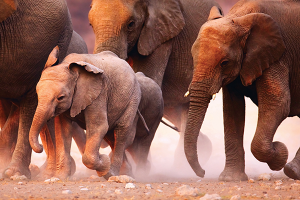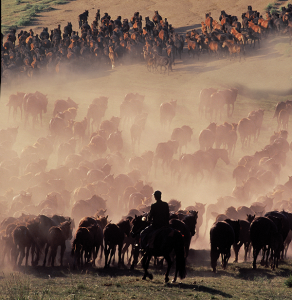When the Human in Humanism Isn’t Enough
 Original artwork by Johannes Stotter
Original artwork by Johannes Stotter Humanism has long been one of the most important progressive forces in the development of world culture. It has always championed reason and argued against irrational fracturing of the human species into camps of “us vs. them” along the lines of race, nationality, religion, or any other perceived difference. But humanism still harbors a dark division, one we must now face. As subscribers to the Humanist magazine will surely have noticed, there is a definition printed in a large bold box on the inside front cover of every issue. It states:
Humanism is a rational philosophy informed by science, inspired by art, and motivated by compassion. Affirming the dignity of each human being, it supports liberty and opportunity consonant with social and planetary responsibility. Free of theism and other supernatural beliefs, humanism derives goals of life from human need and interest rather than from theological or ideological abstractions, and asserts that humanity must take responsibility for its own destiny. [Emphasis mine.]
Aside from the one word and one phrase noted in bold, I find this to be a wonderful statement around which all of humanity could unite. Those two small points, however, are representative of a deep fracture that has opened up between the human species and the rest of life on this planet to which we are very much related and upon which we are utterly dependent. And just as past humanists saw the harm divisions among human tribes can cause, we must now confront this next divide.
The Harms of Division
In the existing definition of humanism, we affirm the dignity of each human being, but we don’t extend this consideration to other beings. We say we’re responsible for the planet as if we owned it, and we only consider human needs for the goals that we set. These are unquestionably acts of “speciesism”—a prejudice or biased attitude (akin to racism or sexism) that favors the interests of one’s own species against those of members of other species. This concept gained recognition around the world when philosopher Peter Singer used it in his book Animal Liberation, first published in 1975. The green criminologist Ragnhild Sollund (her field analyzes environmental harms from a criminological perspective) has pointed out, however, that this concept must make the distinction that the systemic abuse humans inflict on other animals is something categorically different than the treatment individuals of other animal species subject other non-human animals to. In other words, the widespread disregard for other forms of life that our own successful species takes for granted is a qualitative leap from the culling of weak antelopes from the herd by a pack of lions.
Such language may sound strange to many, but this is because words shape us, and the dominant linguistic paradigm is deeply speciesist in nature. Philosopher Stephen Clark argues that we resist the notion that we’re animals and mean something quite negative when we say that someone has “acted like an animal.” Criminologist Piers Beirne notes that we refer to ourselves as “human beings” without hesitation, but we find the term “animal beings” odd. And animal rights advocate Joan Dunayer suggests in her 2001 book Animal Equality that terms such as “caretaker,” “collection,” and “aquarium” be replaced with “captor,” “prisoners,” and “aquaprison,” respectively. She also recommends replacing “pork” with “pig flesh,” “beef” with “cow flesh,” “beef producer” with “cattle enslaver,” and so on. This proposed terminology indeed sounds shocking, but is it inaccurate? If you readily accept these terms, surely you don’t need further persuading. However, if these seem patently absurd to you, that just illustrates how species-biased our language really is.
The question then becomes, is there anything wrong with this? So what if we’re speciesist? As genocides of humans around the world have shown, viewing others as “the other” enables institutionalized harm and exploitation. In an October 24, 2015, New York Times philosophy essay titled “Why I Identify As a Mammal,” professor Randy Laist makes the point that “human exceptionalism—expressed in our treatment, use, and abuse of other animals, and in the damage we do to the natural environment—has paved the way for enormous harm. It seems clear, then, that identifying exclusively as human has its pitfalls.” We humans are exceptional in the definitional sense that we are great or unusually outstanding, but we are not exceptional in some way that sets us apart from the rest of the tree of life.
Just as American exceptionalism has at times been used to justify human rights abuses around the planet, human exceptionalism is being used to rationalize the callous, short-sighted destruction of life everywhere to the point that human activity is currently causing the sixth great extinction event in Earth’s history and endangering our own future. This has been the result of persistent and planet-wide animal abuse, which includes: animals in factory farming; the killing of other animals for food; animals in experiments; animals as clothing; animals used for entertainment; wildlife trafficking; and, of course, the too-rarely-questioned destruction of animal habitats for the purposes of fulfilling insatiable human desires. Looked at objectively, it’s as if having the power to abuse animals has been generally interpreted as giving us the right to do so. But “might makes right” is not an acceptable argument.
Our speciesism isn’t confined to just harming “others;” it’s unquestionably a threat for humanity’s future that impacts us negatively in the present as well. If such alienation and isolation were exhibited from a group of human individuals towards the rest of society, they would be considered dysfunctional and potentially suffering from narcissistic neuroses and psychoses. As Joanna Macy, author and scholar of deep ecology says, “I am convinced that this loss of certainty that there will be a future is the pivotal psychological reality of our time. The fact that it is not talked about very much makes it all the more pivotal, because nothing is more preoccupying or energy-draining than that which we repress.” The field of ecopsychology has sprung up to treat such ills and argues that we cannot be whole and at peace until we do so. As ecopsychologist Andy Fisher explains,
The human psyche emerged from this earthly world and remains tied to it. The delusion that we can break this tie—that we can forget our kinship, our intimate relations, with plants, animals, and soil, that we can dissociate ourselves from bodily and ecological rhythms, imposing a mechanical order of time instead, that we can do all these life-denying things without consequence to the integrity of both our minds and the rest of earthly creation—this is the serious problem ecopsychology addresses.

Photo by Johan Swanepoel
There are, of course, those who make arguments against accusations of speciesism. Some claim the physical differences between humans and other species are sufficient to be morally relevant. Ayn Rand’s Objectivism holds that humans are the only beings who have “conceptual consciousness,” i.e., the ability to reason and develop a moral system. She argued that humans are therefore the only species entitled to rights, although apes, wolves, elephants, whales, and other “animal intelligentsia” have all been seen acting with early forms of moral behavior. Rand’s dividing line is much blurrier than she imagined. A far more reputable source, British philosopher Roger Scruton, argues that the idea of rights and responsibilities is distinctive to the human condition and it makes no sense to spread them beyond our own species. He contends that those who wish to halt speciesism are guilty of pre-scientific anthropomorphism, although modern genetic and evolutionary sciences are more likely to prove that he is in “anthropodenial.” As coined by the primatologist Frans de Waal, anthropodenial is “a blindness to the humanlike characteristics of other animals, or the animal-like characteristics of ourselves.” As soon as we come to accept “that animals are far more like our relatives than like machines,” says de Wall, “then anthropodenial becomes impossible and anthropomorphism becomes inevitable and scientifically acceptable.”
In fact, in the philosopher Peter Singer’s edited volume In Defense of Animals, Tom Regan persuasively argues in that this anti-speciesism movement, rather than undercutting the case for human rights, is actually aligned and consistent with support for the dignified treatment of humans as well. This is important so let’s quote him at length.
Well, perhaps some will say that animals have some inherent value, only less than we have. Once again, however, attempts to defend this view can be shown to lack rational justification. What could be the basis of our having more inherent value than animals? Their lack of reason, or autonomy, or intellect? Only if we are willing to make the same judgment in the case of humans who are similarly deficient….The theory that underlies the case for animal rights shows that the animal rights movement is a part of, not antagonistic to, the human rights movement. The theory that rationally grounds the rights of animals also grounds the rights of humans.
The Dissonance within Humanism
Given all of the above, it follows that humanists ought to align themselves readily with more ethical treatments of nonhuman animals. Despite the slightly speciesist language in this very magazine’s definition, perhaps many self-identified humanists are already on board with the idea. But I fear too many have read too much into the humanist moniker and fallen into the trap of human exceptionalism. Some humanists have clearly mistaken humanism to mean human dominated.
I published an article in the Humanist last year titled, “Proposing an Objective, Godless Basis for Morality,” in which I wrote that the survival of “life in general” over evolutionary spans of time is an objective goal that we must all want and is therefore the fundamental bedrock upon which all moral prescriptions must be built. Without life, morality doesn’t exist; so if morals aren’t leading towards the survival of life, they must be wrong. Life can survive without us humans, I noted, but we can’t survive without the rest of life. I received some pointed criticism for my “evil” moral position that suggested I don’t care much about human beings.
On the contrary! I think the survival of our species is incredibly important—more important than religious rights or economic freedom, for example. This is especially true since we are the only species that would currently be able to save all of life from something dire like an impending asteroid strike. Because of this, our own survival concerns may be weighted as more important than those of, say, a tropical leech. In a blind universe with no supernatural being watching over us all, if it’s truly a case of us vs. them, then I think we’re justified to act for us. However, it’s rarely the case of them threatening us anymore; instead we’re the ones who need to be more cautious about valuing our nonexistential concerns (again, using full economic freedom as an example) over the survival concerns of other species. To prioritize that way is explicitly speciesist.
I admit that between these two moral positions—defining good and evil in purely human terms vs. considering the position of “life in general”—there is a great deal of overlap. Since all of life is so enmeshed in an intricate web of support, and we humans are indeed just a subset of “life in general,” if you concern yourself with the survival of humans, you have to concern yourself with the survival of other forms of life. When we truly do what is good for the very long-term survival of humanity, we are obliged to take care of much of the rest of life as well. Even religious practitioners embrace the idea that we are “stewards of the earth.” But such a human-centered view of the world too easily slides into speciesism, and a simple thought experiment shows why concern for humans isn’t enough for humanism.
Imagine a sci-fi scenario where humans discover a new substance that boosts our intelligence and productivity and gives us feelings of tremendous happiness without any known side effects. For twenty years, pills containing this substance work so well that eventually every single human in the world has taken it and we’re 100 percent sure that it will be passed down through our genes to all our future children. Then, tragically, scientists discover that this substance degrades after thirty years in our bodies, whereupon it dissolves all carbon molecule bonds it comes into contact with. Let loose in the world, the substance would destroy all life as we know it.
In this thought experiment, the chance of humanity surviving is zero. We’ve screwed up big time, but the survival of life still hangs in the balance. So what’s the “good” thing to do? Would we just soak up the last of our physical pleasures, or would we feel compelled to act for the survival of “life in general” by jettisoning our contaminated bodies into space? I strongly believe we’d do the latter. Our moral concern for our extended kin would compel us to protect them. Once our existential survival was taken away, only lesser concerns like economic, religious, or hedonistic desires would remain. But this scenario makes it clear that these are secondary to the existential survival concerns of the rest of life. If we were to insist upon the destruction of the rest of life for the sake of, let’s say, one more day of human fun, then that would be the very definition of selfish, destructive, and therefore immoral behavior. I believe humans would be better than that, and I surely think we ought to be, although we’re not acting that way now while we still think we can all survive the status quo.
Choice for a Larger View

Photo by Beijing Hetuchuangyi Images Co., Ltd
None of this means we all have to become vegans or be like the Buddhists of Mongolia who refuse agriculture and curl their boots so as not to break the earth and disturb sentient creatures when they walk. Life everywhere is a cooperative venture with creation and destruction necessary at all times. No matter how hard we try, we cannot exempt ourselves from that. But we can try our best to find a better balance between our needs and the long-term survival of all.
Many long-lasting pre-industrial societies have understood this implicitly, but such balance is explicitly expressed in the philosophy of communitarianism. While the freedoms and liberalism of the Enlightenment can be viewed as understandable and beneficial reactions to centuries of authoritarianism, oppressive governments, and rigid religious dogmas, I would argue we have now taken this too far. Modern communitarianism is a reaction to this; it is a reaction to excessive individualism with its overemphasis on individual rights that has led people to become selfish and egocentric. Communitarian philosopher Amitai Etzioni writes that all societies must have a carefully crafted balance between rights and responsibilities and between autonomy and order. Focusing on one side alone is not enough.
With the modern developments of the science of ecology and the revelations we have uncovered from evolutionary history, we now see that we must extend this communitarian balance to the community of life as well. Norwegian Philosopher Arne Naess, coined the term “deep ecology” to capture this richer understanding and distinguish it from the shallow prevailing utilitarian pragmatism of western businesses and governments. Naess instead advocated that a true understanding of nature would give rise to a point of view that appreciates the value of biological diversity, understanding that each living thing is dependent on the existence of other creatures in the complex web of interrelationships that is the natural world. That is the wise, holistic, non-speciesist viewpoint we humanists must adopt. As pioneering environmentalist Aldo Leopold wrote in 1949 in A Sand County Almanac:
In human history, we have learned (I hope) that the conqueror role is eventually self-defeating. Why? Because it is implicit in such a role that the conqueror knows, ex cathedra, just what makes the community clock tick, and just what and who is valuable, and what and who is worthless, in community life. It always turns out that he knows neither, and this is why his conquests eventually defeat themselves.
We are in charge of our own destiny, so we must choose not to defeat ourselves. With everything I’ve outlined here—the dangers of speciesism, the crises of our planet, and the rational opportunity we have to do better—I strongly urge the humanist community to consider two small changes (in bold) to the Humanist’s definitional masthead:
Humanism is a rational philosophy informed by science, inspired by art, and motivated by compassion. Affirming the dignity of each human being, it supports liberty and opportunity consonant with social and planetary dependence and obligations. Free of theism and other supernatural beliefs, humanism derives goals from the natural needs and interests of life, rather than from theological or ideological abstractions, and asserts that humanity must take responsibility for its own destiny.
Though slight, these changes would be indicative of the moral leadership humanists are ready to assume. Such an update could lead to a more balanced and durable humanism that further unites us and serves as a regular reminder that we humans must humbly take our place within the grandest view of life that we are so privileged to have discovered.
